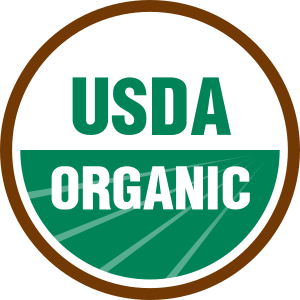So how do you find products that are truly natural, or organic? First of all, "natural" just means the product contains something somewhere that came from nature. This doesn't mean the entire product is actually from natural sources. (100% natural is another matter.) The same thing with the "organic" label.
 Image via WikipediaBy law, a product must specify what percentage of the ingredients are actually certified organic. However, a product can claim it is "organic," even if only one organic ingredient (in sufficent amounts) is present, as long as it specifies in the tiny print on the label, which ingredients are organic.
Image via WikipediaBy law, a product must specify what percentage of the ingredients are actually certified organic. However, a product can claim it is "organic," even if only one organic ingredient (in sufficent amounts) is present, as long as it specifies in the tiny print on the label, which ingredients are organic.Here are some helpful tips to navigate through the "natural" beauty product jungle:
1. Look for products marked "100% Organic", and also with the "Certified Organic" sticker. ("100% Natural" is also good, but be aware this does not mean organic.) If you can't find 100% Organic products (which in some items may be very difficult or impossible to find), go for the highest percentage possible, and try to make sure the other items are at least natural, if not organic.
2. Look for products with ingredients you can identify. I like to only purchase products if I can actually pronounce all of the ingredients! This doesn't mean you have to know exactly what everything is. For example you may see the ingredient "rosehip seed oil", and not know what a rosehip is, but you can at least recognize that it is a natural substance. As an opposite example, recently there has been quite a bit of talk about parabens, and how bad they are for you (many new products even advertise "paraben free!" on the label). Therefore, if you see something like "methylparaben" on the label, you don't have to know exactly what a paraben is and how it works, to know you should avoid that product.
3. If you are buying all-natural products, be aware that they may have a shorter shelf-life than the usual chemical-laden fare. Therefore, we recommend where possible, that you purchase direct from the manufacturer, so you know the item is fresh. For example, the leading manufacturer of organic beauty products & skin care that we recommend on our website makes all their products in small batches, so that they will be as fresh as possible when you order them. If you purchase their products from another store, you may not know how long they have been sitting on the shelf. (Also check the label carefully, as some may recommend refrigeration.)
4. Seriously, if you can't pronounce it, it's probably a chemical you don't want on or in your body! (With the exception of some products that list natural plant-based ingredients by their scientific names -- but usually they will list the common name -- e.g. "rosehip seed oil" -- as well.) Ingredient lists for most items will also probably be much shorter than for traditional products, as natural products don't (or shouldn't!) contain artificial fragrances, dyes, or preservatives.
Hopefully this will serve as a handy checklist, next time you are bogged down in the "natural" beauty product aisle! Just remember, don't just look for "natural" or "organic" on the front of the bottle -- check the label, and look for "100%". Also look for a short list of ingredients which you can identify (or at least spell!), and an expiration or "use-by" date.
Happy shopping! And for our recommendations of our favorite truly natural and organic products (as well as lots of other tips and ideas for avoiding toxins in your home), feel free to stop by our website at www.newholisticliving.com/toxicload.html.
And if you have any other recommendations, feel free to leave a comment!
Rose.


No comments:
Post a Comment